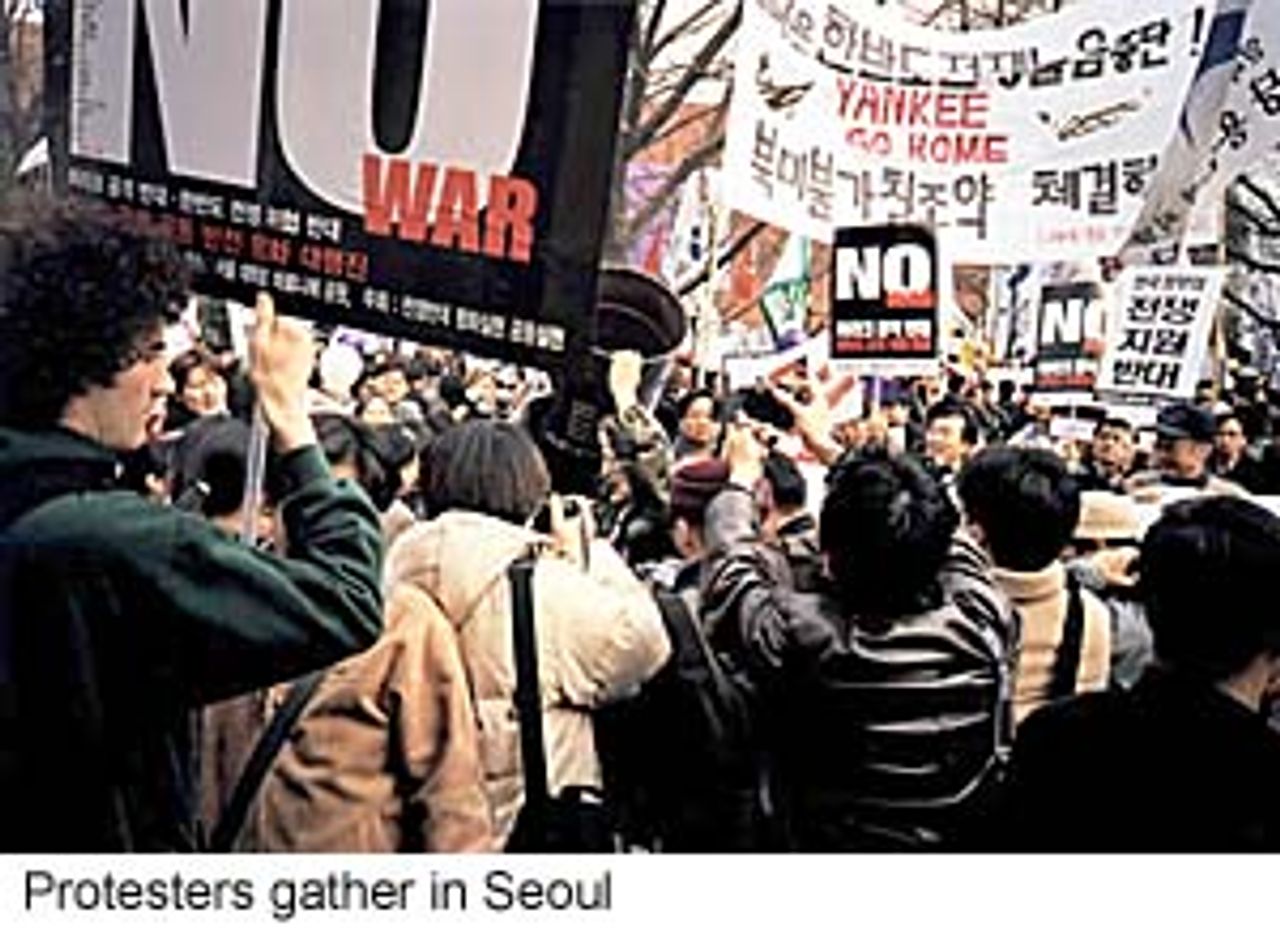Some 2,000 people assembled in Ma-ron-i-ea Park in downtown Seoul on Saturday afternoon to protest against the planned US invasion of Iraq. After speeches and entertainment, the protesters marched to Jong-Myo Park, a couple of kilometres away. The proceedings were peaceful despite a large police presence throughout the protest.
 Ma-ron-i-ea Park is a popular meeting point for young people and artists. Although it was a cold afternoon, a wide cross-section of people attended. Many were students, as well as young families and workers. The organisations represented included trade unions, women’s groups, religious groups and student organisations. A diverse range of immigrants participated, including from Algeria, Sri Lanka, India, the Philippines, America and Canada.
Ma-ron-i-ea Park is a popular meeting point for young people and artists. Although it was a cold afternoon, a wide cross-section of people attended. Many were students, as well as young families and workers. The organisations represented included trade unions, women’s groups, religious groups and student organisations. A diverse range of immigrants participated, including from Algeria, Sri Lanka, India, the Philippines, America and Canada.
The protest swelled to 3,000 at Jong-Myo Park, which is significant in South Korea as a meeting point for the civil rights movement. Speeches by various groups continued until nightfall when candles were lit. The park was surrounded by a huge police presence, with the number of riot police almost equalling the number of protesters.
One or two groups held up anti-American banners such as “Yankee go home” and demanded the withdrawal of US troops from South Korea. The majority adopted slogans against war, including “No War for US Oil and Profit”. Many denounced the US government as the most prominent terrorist organisation. The crowd chanted “No war” and “Don’t attack Iraq” in Korean and English. Some groups called for an end to any South Korean support for US forces in the Persian Gulf.
Despite the one-sided coverage in the South Korean media, everyone who spoke to the WSWS said the war drive had nothing to do with disarming Iraq or the other pretexts offered by Washington. The overall sense was that the war was about oil. Many people said the protests would not alter US and British plans for war but felt that they had to do something to express their opposition.
A South Korean student explained that he was not anti-American and that Korean and American workers had to join together. A young Algerian worker pointed to the hypocrisy of the US and British governments, which denounced terrorism while supporting Israel against the Palestinians. He said the Israeli government were the terrorists and breakers of UN law.
Other antiwar protests took place in the South Korean cities of Pusan, Taegu, Taejon, Kwangju and Wonju.
A WSWS correspondent from Beijing emailed the following comments:
“There are no reports of any protests in mainland China, so I conclude that nothing happened. A protest could only happen if some individuals were to go to US Embassy on their own and raise a banner.
“Chinese Central TV and other media did report on ‘Global antiwar demonstrations’ and broadcast short video shots of demonstrations from Europe and US, including from Asia, like Tokyo and Korea, labelling it ‘unprecedented’ since the Vietnam War. It would be more correct to say: Global minus China, due to two factors: [Beijing’s] appeasement of imperialism and its fear of any public protest, whatever its content.
“It is interesting that the mainland media didn’t mention demonstrations in Hong Kong—not a word, let alone a photograph or video. Hong Kong did have demonstrations, though of modest scale—up to 1,000 on Saturday.”
Elsewhere in North East Asia, an estimated 25,000 marched in Tokyo on Friday, with thousands more taking part in smaller rallies in Osaka and other cities. The Tokyo protesters demanded that the Japanese government refuse to give any support to an attack on Iraq. They included a delegation of survivors of the 1945 atomic bombings of Hiroshima and Nagasaki.
In Taiwan, over 2,000 people marched in the capital Taipei on Saturday, under the banner of “No Blood for Oil”. They gathered at the office of the American Institute, holding placards such as “War is not the answer” and “Bombing solves nothing”.
